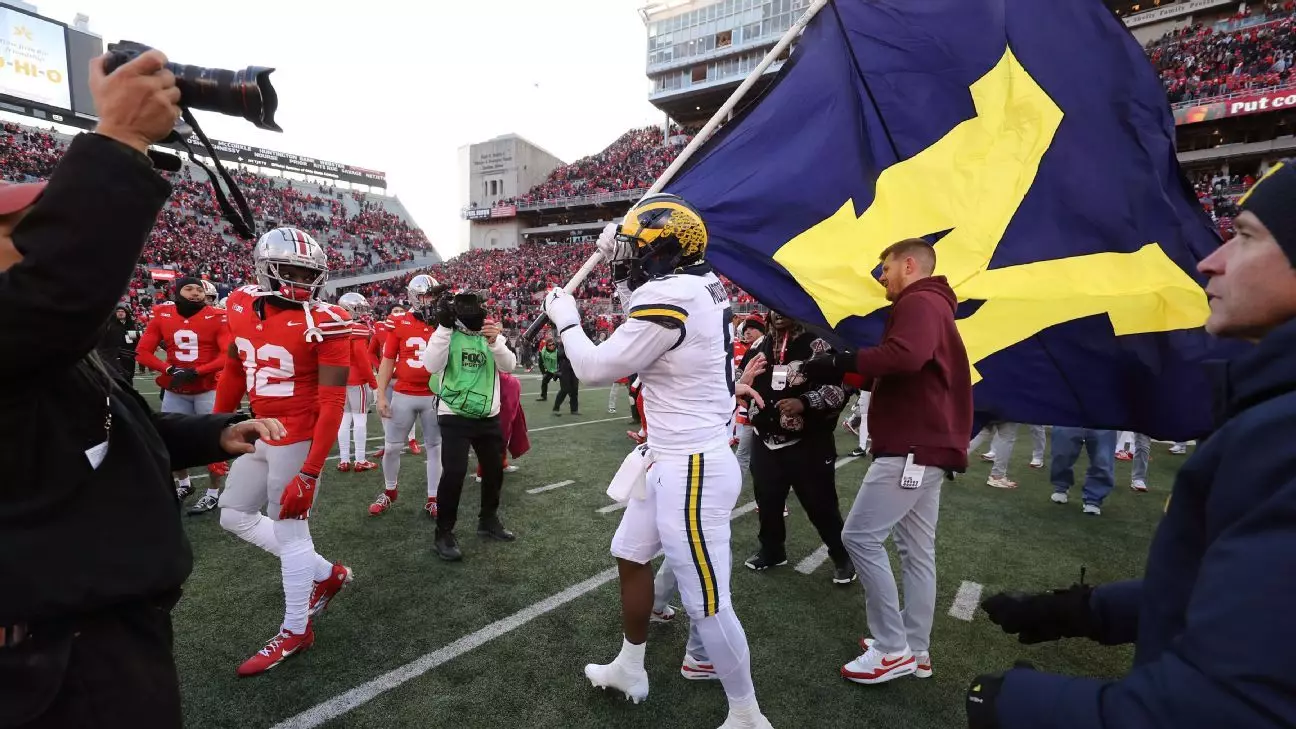The recent clash between Michigan and Ohio State showcased not only the fierce rivalry inherent in college football but also the extremes to which emotions can escalate following a major upset. Michigan’s unexpected 13-10 victory over the second-ranked Buckeyes sparked an altercation that blurred the lines between competitive spirit and sportsmanship. This incident unfolded dramatically at The Horseshoe, a stadium often synonymous with spirited college athletics, but this time it descended into a chaotic spectacle requiring police intervention.
Leading up to the game, the Wolverines were seen as the underdogs, with a staggering 20.5-point spread dominating discussions. As the clock wound down and the Wolverines made their presence known on the Buckeyes’ turf by planting their flag, it was a symbolic act that drew the ire of Ohio State players. The act of planting the flag can be interpreted not just as a celebration but also a provocation, challenging the pride and reputation of the Buckeyes on their home field. This incendiary gesture set the stage for the ensuing chaos, demonstrating how deeply rivalry can run in college sports.
What began as a celebratory moment quickly morphed into an uncontrollable brawl. Michigan players reveled in their victory, gathering around the Block O logo, a symbol of Ohio State pride. However, this display of triumph triggered a powerful response from the Buckeyes, leading to punches being thrown and blood being shed. Coaches from both teams, including Michigan’s Sherrone Moore and Ohio State’s Ryan Day, found themselves attempting to mediate a situation that spiraled out of control. The role of law enforcement was vital, as officers used pepper spray to disperse the melee, highlighting the severity of the situation. Injuries to players and at least one officer underscore the physical toll of the incident, leaving observers to question whether such altercations are an unfortunate byproduct of rivalry or if there needs to be stricter regulations to prevent them.
In the aftermath, both coaches expressed regret about the eruption of violence and emotional flare-ups. Ryan Day’s frustration was palpable as he recounted the moment, emphasizing that pride was at stake on their home turf. Conversely, Moore recognized the emotional volatility on both sides but lamented the lack of decorum following such a significant game. Rivalry games, particularly one as historic as Michigan versus Ohio State, naturally heighten tensions, but boundaries must be set regarding acceptable expressions of competitiveness. Such commentary raises questions about emotional regulation in high-stakes sports and the responsibilities of coaches and athletes to model sportsmanship.
Throughout the brawl, players exchanged heated words and gestures, which ultimately extends our conversation to the bigger implications for college athletics. Kalel Mullings, a standout player from Michigan, characterized the post-game altercation as “classless,” alluding to a troubling culture that allows emotions to dictate actions after the final whistle. His criticism emphasizes the need for accountability and conduct within the sport, fostering a dialogue concerning how future generations of players might learn to celebrate or cope with losses gracefully.
As college football continues to embody fierce rivalries, the Michigan-Ohio State brawl serves as a microcosm of the ongoing battle between pride in victory and the magnanimity of sportsmanship. Amid the excitement and adrenaline-fueled moments, it is crucial for both players and coaches to abide by principles that honor the spirit of competition. By reflecting on incidents like this, stakeholders in college athletics—be they players, coaches, or officials—can strive to maintain the integrity of the game and foster a more respectful environment. Moving forward, it remains to be seen what steps will be taken to prevent such incidents, ensuring that the passion of college football thrives without sacrificing the essential ethical values that define the sport.


Leave a Reply